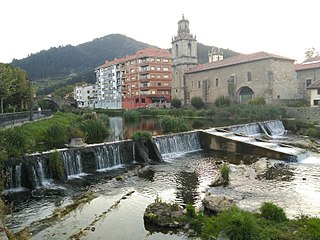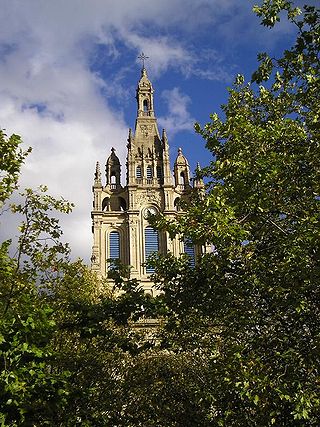1874 (MDCCCLXXIV) was a common year starting on Thursday of the Gregorian calendar and a common year starting on Tuesday of the Julian calendar, the 1874th year of the Common Era (CE) and Anno Domini (AD) designations, the 874th year of the 2nd millennium, the 74th year of the 19th century, and the 5th year of the 1870s decade. As of the start of 1874, the Gregorian calendar was 12 days ahead of the Julian calendar, which remained in localized use until 1923.

Tomás de Zumalacárregui e Imaz, known among his troops as "Uncle Tomás", was a Spanish Basque officer who led the Carlist faction as Captain general of the Army during the First Carlist War. He was occasionally nicknamed the "Wolf of the Amezcoas", making reference to his famous military victory in the region of Navarre.

Nervión is a river that runs through the town of Bilbao, Spain into the Cantabrian Sea. Its lowermost course, downstream of its confluence with the Ibaizabal River, is known as the Estuary of Bilbao.

Baldomero Fernández-Espartero y Álvarez de Toro was a Spanish marshal and statesman. He served as the Regent of the Realm, three times as Prime Minister and briefly as President of the Congress of Deputies. Throughout his life, he was endowed with a long list of titles such as Prince of Vergara, Duke of la Victoria, Count of Luchana, Viscount of Banderas and was also styled as "the Peacemaker".

The First Carlist War was a civil war in Spain from 1833 to 1840, the first of three Carlist Wars. It was fought between two factions over the succession to the throne and the nature of the Spanish monarchy: the conservative and devolutionist supporters of the late king's brother, Carlos de Borbón, became known as Carlists (carlistas), while the progressive and centralist supporters of the regent, Maria Christina, acting for Isabella II of Spain, were called Liberals (liberales), cristinos or isabelinos. Aside from being a war of succession about the question who the rightful successor to King Ferdinand VII of Spain was, the Carlists' goal was the return to a traditional monarchy, while the Liberals sought to defend the constitutional monarchy.

The Third Carlist War, which occurred from 1872 to 1876, was the last Carlist War in Spain. It is sometimes referred to as the "Second Carlist War", as the earlier "Second" War (1847–1849) was smaller in scale and relatively trivial in political consequence.

The Cadagua or Kadagua River drains the Biscayan area of Encartaciones, from the Castilian valley of Mena to Barakaldo and Bilbao, where it forms the border between these municipalities and ends at the Estuary of Bilbao. Another important town that this river crosses is Balmaseda.

The Basilica of Begoña is a basilica in Bilbao, in Spain, dedicated to the patron saint of Biscay, the Virgin Begoña.

The Battle of Bilbao, part of the War in the North in the Spanish Civil War, saw the Nationalist Army capture Bilbao and the rest of the Basque Country that was still being held by the Spanish Republic.

The British Auxiliary Legion, also called the British Legion or Westminster Legion, existed from 1835 to 1837. It was a British military force sent to Spain to support the Liberals and Queen Isabella II of Spain against the Carlists in the First Carlist War.

The Battle of Oriamendi was fought on 16 March 1837 during the First Carlist War. The battle was an overwhelming victory for the Carlists.

Admiral of the Fleet Thomas Maitland, 11th Earl of Lauderdale, was a Royal Navy officer and peer. As a junior officer he saw action supporting the blockade of Algiers by Greek revolutionaries in July 1824 during the Greek War of Independence and then took part in an operation to land a naval brigade in Brazil to protect Pedro I, the Emperor of Brazil, in the face of the Irish and German Mercenary Soldiers' Revolt. He also took part in the Battle of Luchana, an operation to defend the Port of Bilbao on the north coast of Spain, during the First Carlist War.

The Battle of Irún was the critical battle of the Campaign of Gipuzkoa prior to the War in the North, during the Spanish Civil War. The Nationalist Army, under Alfonso Beorlegui, captured the city of Irún cutting off the northern provinces of Gipuzkoa, Biscay, Santander, and Asturias from their source of arms and support in France.

Marcelino de Oraá Lecumberri (1788–1851) was a Spanish military man and administrator. Born in Beriáin in Navarre, he distinguished himself as a cadet during the War of Spanish Independence. He was married to Josefa de Erice, later Condesa de Chiva y Vizcondesa de Oráa.
The Battle of Alsasua, also known as the Battle of Altsasu or la Acción de la Venta de Alsasua, occurred on April 22, 1834 in Navarre, Spain, during the First Carlist War. Carlist general Tomás de Zumalacárregui attacked a convoy led by the Liberal general Vicente Genaro de Quesada traveling from Vitoria-Gasteiz to Pamplona at the town of Alsasua.

Lutxana is a station of line 1 of Metro Bilbao, also served by the Lutxana-Sondika shuttle operated by Euskotren Trena. It is located in the neighbourhood of Lutxana-Enekuri, in the municipality of Erandio. In its current inception, the station was opened on 11 November 1995. Since 2015, the station has also been served by Euskotren Trena suburban trains.

The San Antón Bridge is an arch bridge in Bilbao, Spain. It spans the Estuary of Bilbao, linking the neighborhoods of Bilbao La Vieja and Casco Viejo. It is the oldest bridge in the city, with the original bridge being opened before 1318. At the time of its opening, and during centuries, it was the only bridge that crossed the river. It is located next to the Church of San Antón.

The bombing of Durango took place on 31 March 1937, during the Spanish Civil War. On 31 March 1937 the Nationalists started their offensive against the Republican held province of Biscay. As part of the offensive the Aviazione Legionaria and the Legion Condor bombed Durango, a town of 10,000 inhabitants that was also a key road and railway junction behind the frontline. Around 250 people are believed to have died in the bombing.
Events from the year 1836 in Spain.
The following is a timeline of the history of the city of Bilbao in the Biscay province of Spain.
















